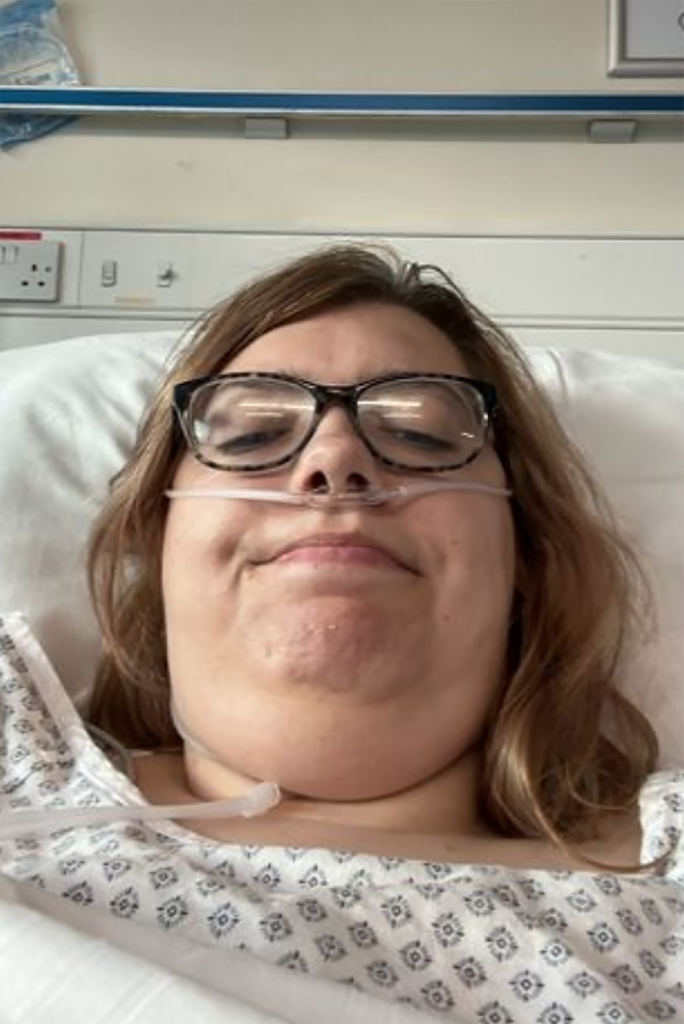Understanding Bowel Cancer
- A young woman from Sutton, United Kingdom, was diagnosed with bowel cancer after her symptoms were repeatedly dismissed as Covid-19.
- During Jade Colburn’s third hospital stay, she had a colonoscopy, which revealed she had bowel cancer. But during her previous hospital stays and doctor visits, she was told her shortness of breath was just Covid-19.
- Bowel cancer, also referred to as colorectal cancer, is the third most common cancer affecting men and women in the United States. It also kills more Americans each year than every other form of cancer except lung cancer.
Jade Colburn was 26 years old when she began to experience shortness of breath. It was July 2020, and she felt like she couldn't catch her breath.
Read More
"A five-minute walk to the shop would take me 15 minutes and I would have to sit down twice," she said of her breathing troubles. This caused her to again call her doctor, who again suggested she take a Covid test.
But on New Year's Eve 2020, Jade said her lungs felt like they "turned to jelly" and "I just collapsed. My body didn't feel like I controlled it."
Jade was rushed to a nearby hospital, and blood tests performed there showed her hemoglobin levels (a protein in your red blood cells that carries oxygen to your body's organs and tissues and transports carbon dioxide from your organs and tissues back to your lungs) were very low. So, she spent the holiday getting a blood transfusion.
Jade's symptoms didn't go away, but in June 2021, she ended up testing positive for Covid-19. Her shortness of breath and difficulty breathing was only exacerbated by the illness, so she ended up back in the hospital.
They performed more scans on Jade, but this time, a radiologist "noticed something" on her bowel on the right side of her colon. So, Jade was booked for a colonoscopy (an exam used to detect changes or abnormalities in the colon and rectum) so her doctor could take a closer look.

After she had her colonoscopy procedure, a consultant recognized the "something" on Jade's bowel as cancer, even before the biopsy results came back. Jade was diagnosed with bowel cancer in August 2021.
"When I first got told (that I had cancer), I was tearful; the instinct is you think of death," she told The Mirror. "But it was good to have a diagnosis of what caused me to be so ill."
It seems like Jade's cancer was caught early because she went in for surgery at the end of September 2021 and by October, she was given the "all clear."
While her health scare is over, she's telling her story now to raise awareness.
"A lot of people forget it can affect people from a younger age, so my main message is if you do feel ill, go and get checked out," she said.

Understanding Bowel Cancer
Bowel cancer, also referred to as colorectal cancer, is the third most common cancer affecting men and women in the United States. It also kills more Americans each year than every other form of cancer except lung cancer.
In the U.K., where Jade lives, bowel cancer is the second most common cause of cancer death, according to Cancer Research UK, accounting for 10% of all cancer deaths.
Dr. Paul Oberstein explains the symptoms of colon cancer.
Many symptoms of bowel cancer are similar to those of irritable bowel syndrome, so make sure to consult with your doctor.
“I had right side colon cancer,” Jade told The Mirror, “so my symptoms are very different to what you would expect.”
While Jade’s symptoms weren’t common, Dr. Paul Oberstein, director of the Gastrointestinal Medical Oncology Program at NYU Langone's Perlmutter Cancer Center, previously told SurvivorNet a few common symptoms of the disease to look out for:
- Change in bowel movements sudden changes to the size, consistency or caliber of stool
- Change in stool color bright red or black stool is a sign that an individual should seek medical attention
- Pain in the abdomen unusual discomfort or bloating of the stomach. In the case of women, pain isn't related to the menstrual cycle.
- Sudden and unexplained weight loss rapid drop in weight that isn't the result of diet or exercise
- Anemia Individuals who feel a general sense of malaise or faintness, or are constantly tired or weak much more than usual, may want to consult a doctor.
Learn more about SurvivorNet's rigorous medical review process.

